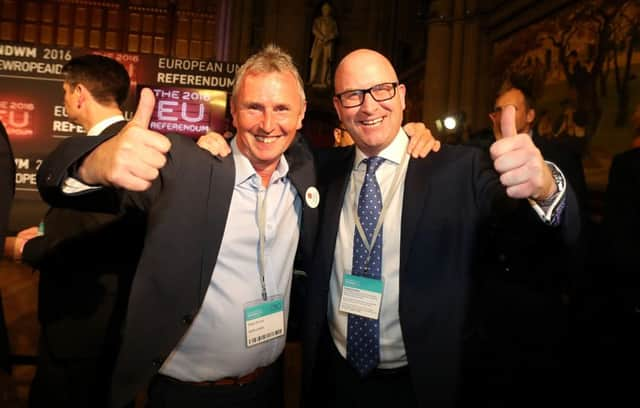Ben Lowry: Rest of West is going for protest votes but not NI, where too much is at stake


Think for a moment about what has happened in a short space of time:
Jeremy Corbyn, a far left MP, sweeps to the leadership of the Labour Party.
Advertisement
Hide AdAdvertisement
Hide AdDonald Trump, a wild and incoherent populist, defies all the experts by winning the formal nomination of the Republican Party as candidate for US president.
Bernie Sanders, who is one of the only people ever to have been elected to the US congress as a socialist, such is the toxic nature of that label in America, gives Hillary Clinton a major run for her money in the Democratic Party race.
Australia and Italy struggle to maintain leaders, both rapidly going through a succession of prime ministers.
The Republic of Ireland elected so many fringe and independent candidates in its general election that it too was almost unable to form a government.
Advertisement
Hide AdAdvertisement
Hide AdAustria comes within a whisker of electing a far right president.
Front National presents a plausible prospect of storming the Elysee Palace.
And of course the UK votes to quit the European Union, sending shockwaves around the world.
Most of these scenarios would have been dismissed by electoral pundits only a few years ago.
Advertisement
Hide AdAdvertisement
Hide AdYet in Northern Ireland, we recently had a remarkably stable Assembly election.
Why might that be?
Well, let us assume for a moment that these momentous votes in numerous countries are a sign of discontent at globalisation or the manifestations of anti elitist rage by an alienated blue collar class and so on, as we are told they might be.
Perhaps then you could call these protest votes.
But in Northern Ireland it seems that we are still too deeply steeped in an ancient feud for voters to risk protest votes in a major election.
In other words, perhaps voters in these other countries – who have less experience of risk – would not be so fast to take some of the huge steps that they are taking, or flirting with, if they too were familiar with the ever-present prospect of massive change.
Advertisement
Hide AdAdvertisement
Hide AdThe decision to back Brexit is the most dramatic manifestation of the western electoral upheaval so far.
My own view, formed some years ago, had been that the UK needed to have a referendum because the European Union had evolved so far from the European Economic Community that we joined in 1973, and was likely to evolve further – yet the people had not been consulted.
A feeling of ambivalence about the appropriateness of a referendum began to emerge as it got closer to a reality, and as I read more and more about it.
The complexity of the issues only seemed to grow the more that I studied it closely – and this was despite the fact that I have been informally following politics in Brussels for three decades and studied for an EU law course as part of my degree, so I was not starting from a position of complete ignorance.
Advertisement
Hide AdAdvertisement
Hide AdBut there were immense matters of trade and business and constitutional law and politics and culture at stake, all of which are complicated and about some of which (ie trade) I knew little.
Any undecided voter who paid close attention to the referendum arguments to and fro will be familiar with the sense of bewilderment that comes from having listened to some of the smartest people in the land argue for one way forward on aspect of A or Z of the EU debate, and then some equally smart people argue the opposite.
An awareness of the gravity and complexity of the decision seemed to widely shared by voters, and caused many citizens considerable anxiety. I noticed that many concerned would-be voters were asking anyone whom they thought might know something about the EU how they ought to vote.
It is no surprise therefore to learn that a notable minority of voters felt buyers’ remorse on June 24.
Advertisement
Hide AdAdvertisement
Hide AdOne of the problems with having an unwritten constitution is that we don’t have set paths for handling vast constitutional upheavals, as happened last week.
In America, the founding fathers 230 years ago saw the need for safeguards. Amending the US constitution is a very hard thing to do and has only been done 27 times. An amendment needs the backing of three quarters of the states (38) and two thirds of both houses of congress (ie 67 senators), which is exceedingly hard to achieve.
But while I am uneasy at how we have suddenly reached this position, Brexit, in such electorally volatile times, there is no going back now.
Thus I tend to agree with Theresa May – an ambivalent supporter of Remain who believes that we have to make the most of the situation we are now in rather than try to reverse the result.
Ben Lowry (@BenLowry2) is News Letter deputy editor